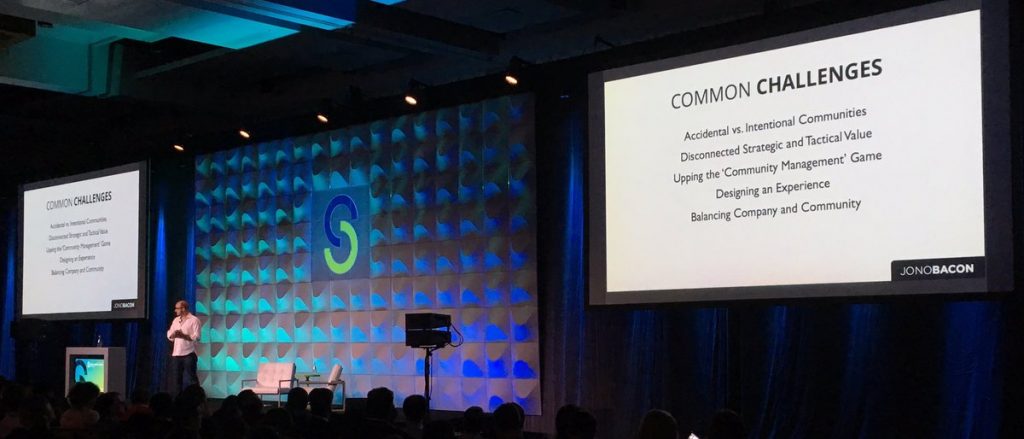The Call For Papers. A battle of wits, personality, and expertise where every contender wants a coveted slot at the conference.
Last week I announced that I am running the Open Collaboration Conference again which is part of the Linux Foundation‘s Open Source Summit. The North American event takes place this year in San Diego from 21st – 23rd August 2019 and the Call For Papers just opened. I will be announcing the European CFP later in the year.
Every year we get an amazing range of submissions, and it got me thinking…what would I recommend to people submitting sessions at this, or other conferences? How do you get your submission picked?
I have been running conferences for most of my career, and here are 7 recommendations I would make to anyone submitting sessions.
Now I want to be very clear: these are my personal recommendations. Not every program committee will share these views, but as a general rule, I think they will help. Be sure to share your tips too in the comments too!
1. Talk about something people really care about
It may seem obvious, but the point of a presentation is to deliver information that should to be of interest to your audience. Now, what kind of information is of interest will be heavily dependent on the type of conference and audience.
For example, at the Open Collaboration Conference, it attracts a pragmatic professional technology audience. That audience has specific types of content they generally care about (e.g. collaborative workflow, community management, incentives and rewards, etc) and technologies they care about (e.g. Slack, GitHub, Discourse, Bitergia). Other conferences will have a different focus and topics.
Think carefully about what your audience is interested in as opposed to what you are. What problems do they want to solve? What are the gaps in their experience? Where do they need guidance. You need to serve a need and purpose, and if you can map your presentation more commonly to these needs, you are more likely to get picked.
2. Share pragmatic advice and experience
At everyone conference I have ever run we get two broad buckets of submissions:
- Big picture talks where the presenter wants to walk through a more general vision of something (e.g. “The future of Open Source“, “The next generation of online banking“.)
- Specialist guidance about solving specific problems or overviews of specific approaches (e.g. “10 ways to harness Salesforce in your business“, “Creating your first smart contract with Ethereum“.)
Great conferences have a mixture of both. The tricky thing from the perspective of a program committee is that only having big picture sessions can make for a very generic program. As such, a limited number of big picture presentations tend to get picked with a larger number of more specialist topics.

Credit
Now, some conferences are more general-purpose in nature, and it can be tempting to only submit big picture sessions. Even if you do this, you should focus on pragmatic guidance. What are the three or five key conclusions your audience should take away? How do they apply those conclusions in their own world?
This will all help draw a clear dotted line between the needs of attendees and what you can offer.
3. Be concise, clear, and emphasize the value you are offering
If people are going to take 30 or 45 minutes of their day to watch you speak, they need to get something valuable out of that time investment. They have a million emails, phone-calls, and documents piling up, so why is seeing you speak worth it?
This needs to be front and center in your submission. List out the value the audience will be able to take away from your session, and this should be as clear and pragmatic as possible.
For example, avoid: “Attendees will get a good understanding of Google Analytics“.
Instead focus on, “Attendees will learn how to measure key Google Analytics metrics (such as visitors, users, and bounce rate), as well as set goals, measure conversions, and much more.“
Focus every inch of your submission on this pragmatic value. You want the program committee to read it and immediately see the value you can bring.
4. Grab attention without being an attention seeker
There is a wide gulf between the best and worst speakers on the conference circuit. The latter are dull, boring sessions that you have to mentally struggle to stay awake to. The former keep you interested, engaged, and excited every step of the way.
Submit sessions that are interesting, engaging, and challenging, but don’t resort to clickbait titles and topics. Break the mold of what people normally talk about and how they discuss it, but stay classy.
Instead of “How to build a go-to-market plan“, consider “Six common flaws in go-to-market plans“. Don’t submit “Dogs are dumb. Got your attention, now come to my talk.“
Also, in-line with the staying classy mantra, keep politics and religion out of your sessions. Also, avoid sexualized imagery, and try not to be an asshole about other people to make a point.
Get creative. Include new and interesting demos. Build tension by sharing how you averted disaster and sharing those principles with your audience. Challenge the norm and conventional wisdom. All this makes for a more compelling session.
5. Avoid product pitches
If there is one sure-fire way to kill your submission at most conferences it is to submit an obvious marketing or product. You may be excited to share the “10 amazing benefits” of using your product, but unless you have something that the audience genuinely cares about, it will be seen as advertising fluff and (likely) get binned.
Be smarter. You can still showcase the great things your product can do, but by teaching another topic and incorporating the product as an ingredient. For example, “How to build a knowledge base with WordPress” is far more interesting to a program committee than “How WordPress can power your business“.
6. Put the ego to one side
I was at a conference a little while back where there were the usual keynotes in the morning. The first keynote was from a speaker with an impeccable business record and was focused, had great content and was down-to-earth. The second speaker had great experience, but used every moment to brag about their accomplishments and how they were an “industry inspiration” (ahem). Frankly, it was embarrassing to watch.

Credit
Look, we all have egos. Sometimes they can get a little out of hand, particularly for those who experience success quickly. You have to be very careful in how much of your ego you let into your submission. Program committees often don’t want ego-ridden sessions, not just because they are annoying, but also because they often become advertising carousels for the speaker’s books, videos, events, and other material they are schlepping.
This presents a challenge though: how do you sell yourself and the value of you as a speaker?
This is how I try to approach it: when you submit the topic for your session, focus on the value the audience will take from the content. Sell the program committee on how it will benefit the conference. Now, focus your experience and chops on the bio where you can really share your accomplishments and experience and why you are the ideal speaker. People expect more extravagance in the bio and this avoids your session description sounding like an Oscars acceptance speech…
7. Get feedback and act on it
It doesn’t matter whether you have been submitting sessions to conference for 20 years or 20 minutes, we all have something to learn.
There is an art to judging what an audience may care about, submitting a compelling session, and then getting it picked.
Similarly, there is an art to delivering awesome talks. Speaking of which (pun throughly intended), you may want to see my 10 Ways To Up Your Public Speaking Game article.
Look at which sessions at the conference got picked and which didn’t. Compare what you submitted and then ones on the schedule. What are the clues you can spot? Was it the topic? Was it the style of the sessions?
Some conferences are happy to provide feedback when your session isn’t selected. Ask for it. It doesn’t hurt, and if they have time, they may respond. Some won’t though as they are often dealing with hundreds of sessions.
Also, ask people who have been speaking for help and guidance. I have learned so much from my friends and colleagues over the years. Again, it doesn’t hurt to ask: the worst thing they can do is blow you off.
Best of luck and let me know how you get on, and I look forward to seeing you all treading the conference boards!








